Plot summary
The year is 1807, and Richard Sharpe is at a very low point in his life. His beloved aristocratic lover, Lady Grace Hale, died in childbirth, along with their newborn son. Her family's lawyers then took all of Sharpe's wealth (loot he obtained in India), claiming it was Grace's, so it reverts to her family. Destitute and relegated to the menial job of quartermaster, Sharpe is on the streets of London, contemplating leaving the army.
First though, he revisits the foundling home where he was raised to get his revenge. He robs and kills Jem Hocking, his childhood tormentor.
Then a former commanding officer, Major General David Baird, finds him in a pub. Captain John Lavisser was assigned a bodyguard for a secret mission to Copenhagen, but the bodyguard was killed, supposedly by a common footpad, and a replacement is needed immediately. Baird persuades Sharpe to take the job. Lavisser does not want a bodyguard since he already has a hulking servant and ex-footpad named Barker, but orders are orders. Lord Pumphrey of the Foreign Office gives Sharpe (but not Lavisser) a contact in case he runs into trouble.
Denmark is neutral, but has a powerful fleet. Napoleon wants it to replace the ships France lost at the Battle of Trafalgar, and Britain is equally determined to see to it that does not happen. Lavisser's task is to bribe the Danish crown prince to hand over the fleet for safekeeping. (Lavisser's grandfather is the prince's chamberlain, and they are also related by marriage.) If that fails, the British will have to seize the ships by force.
When they go ashore in Denmark, Sharpe narrowly escapes being killed by Barker. He walks to Copenhagen and goes to see Ole Skovgaard, the emergency contact. Skovgaard turns out to be the main spy for Britain in Denmark. Meanwhile, Lavisser defects to the Danes and "confesses" that the British have sent an assassin to kill the crown prince. Skovgaard reads this lie in the newspaper and locks Sharpe in a room to await Lavisser. Sharpe escapes just in time. Lavisser turns out to be in the employ of the French; he and his men torture Skovgaard for the names of his contacts throughout Europe. Sharpe manages to kill some of Lavisser's henchmen and drive the rest off. During his stay at Skovgaard's house, he and Skovgaard's beautiful widowed daughter, Astrid, become attracted to each other. They eventually sleep together, and Sharpe contemplates settling down in Copenhagen with her.
When the British besiege Copenhagen, Sharpe joins them. The Danes refuse to surrender their fleet, so the British bombard the city. Sharpe, by now knowing the general layout of Copenhagen, sneaks a small force into the city and guides them to the Danish ships, which have been prepared for burning in case the British break in. The men hide aboard the ships and safeguard them against burning. Meanwhile, Sharpe goes to Skovgaard's, only to find he has been captured and tortured again by Lavisser, who obtains the names of the British spies. Sharpe rescues Skovgaard, kills Lavisser and Barker, and gets the list of names. The city surrenders, and the Danish fleet is captured intact.
Skovgaard will no longer work for the British after what they have done to his city. He also orders Astrid to break up with Sharpe, which she reluctantly does. Lord Pumphrey has Sharpe sent back to England as soon as possible, as he does not want the rifleman to learn that he must have the Skovgaards killed; they know too much.

The Battle of Copenhagen of 1801, also known as the First Battle of Copenhagen to distinguish it from the Second Battle of Copenhagen in 1807, was a naval battle in which a British fleet fought and defeated a smaller force of the Dano-Norwegian Navy anchored near Copenhagen on 2 April 1801. The battle came about over British fears that the powerful Danish fleet would ally with France, and a breakdown in diplomatic communications on both sides.
Sharpe is a series of historical fiction stories by Bernard Cornwell centred on the character of British soldier Richard Sharpe. The stories formed the basis for an ITV television series featuring Sean Bean in the title role.
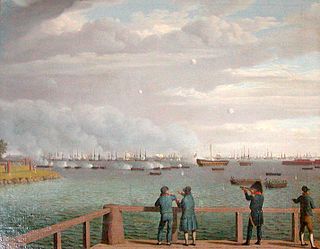
The Second Battle of Copenhagen was a British bombardment of the Danish capital, Copenhagen, in order to capture or destroy the Dano-Norwegian fleet during the Napoleonic Wars. The incident led to the outbreak of the Anglo-Russian War of 1807, which ended with the Treaty of Örebro in 1812. The attack on Denmark, a neutral country, was heavily criticized internationally.
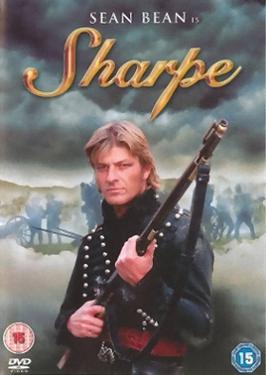
Sharpe is a British television drama series starring Sean Bean as Richard Sharpe, a fictional British soldier in the Napoleonic Wars, with Irish actor Daragh O'Malley playing his second in command, Patrick Harper. Sharpe and Harper are the heroes of the Sharpe series of novels by Bernard Cornwell; most, though not all, of the episodes are based on the books. Produced by Celtic Films and Picture Palace Films for the ITV network, the series was filmed mainly in Crimea, with recordings of other episodes in Turkey, England, Portugal and Spain. The two final episodes were filmed in Jaipur, India.

The Rifle Brigade (The Prince Consort's Own) was an infantry rifle regiment of the British Army formed in January 1800 as the "Experimental Corps of Riflemen" to provide sharpshooters, scouts, and skirmishers. They were soon renamed the "Rifle Corps". In January 1803, they became an established regular regiment and were titled the 95th Regiment of Foot (Rifles). In 1816, at the end of the Napoleonic Wars, they were again renamed, this time as the "Rifle Brigade".
The South Essex Regiment, later the Prince of Wales' Own Volunteers, is a fictional infantry line regiment in the British Army that was created by Bernard Cornwell in the Sharpe novel series.

Sharpe's Havoc: Richard Sharpe and the Battle of Oporto is the seventh historical novel in the Richard Sharpe series by Bernard Cornwell, first published in 2003.

Sharpe's Tiger is the fifteenth historical novel in the Richard Sharpe series by Bernard Cornwell and was first published in 1997. It acts as a prequel to the "original" Sharpe series, which begins in 1809, while Sharpe is a captain in the Peninsular War during the Talavera Campaign in Spain. In Tiger, Sharpe is a private in the 33rd Regiment of Foot, serving in southern India during the Siege of Seringapatam in 1799.

Sharpe's Fortress is the third historical novel of the Richard Sharpe series, by Bernard Cornwell, first published in 1998. It is the last of the Sharpe India trilogy. It tells the story of Ensign Sharpe, during the battle of Argaum and the following siege of the fortress of Gawilghur in 1803.
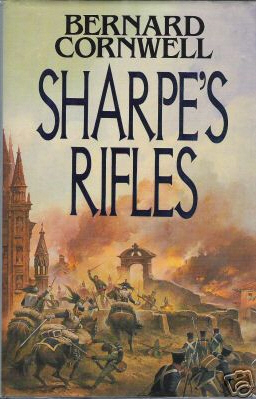
Sharpe's Rifles is chronologically the sixth, but the ninth published, historical novel in the Richard Sharpe series by Bernard Cornwell, first published in 1988. The narrative follows Sharpe and his unit as they are caught up in the French invasion of Galicia, Spain in January 1809 during the Peninsular War.

Sharpe's Trafalgar is the fourth historical novel in the Richard Sharpe series by Bernard Cornwell, first published in 2000. It is the first of the novels in the wars against Napoleon, putting the army ensign at the Battle of Trafalgar in 1805.
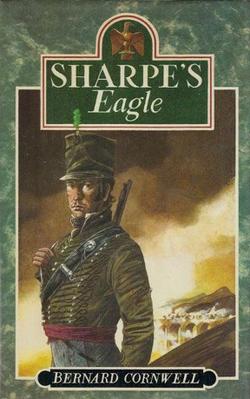
Sharpe's Eagle is a historical novel in the Richard Sharpe series by Bernard Cornwell, first published in 1981. The story is set in July 1809, in the midst of the Talavera Campaign during the Peninsular War. It was the first Sharpe novel published, but eighth in the series' chronological order.
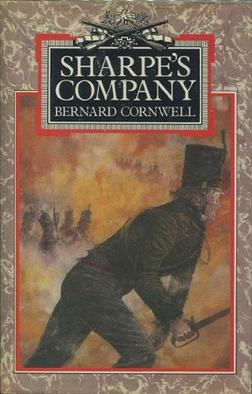
Sharpe's Company is a historical novel in the Richard Sharpe series by Bernard Cornwell, first published in 1982. It was the third in the series to be published, but is thirteenth in chronological order. The story covers January to August 1812, featuring the Siege of Badajoz during the Peninsular War.
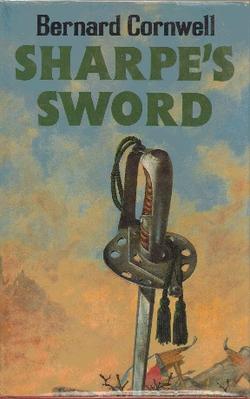
Sharpe's Sword is a historical novel in the Richard Sharpe series by Bernard Cornwell. It is the fourth in the series, being first published in 1983, though the fifteenth chronologically. Set in the summer of 1812 including the Battle of Salamanca on 22 July 1812, the story follows Sharpe and his friend Sergeant Harper involved in espionage while hunting down the sadistic and highly dangerous Colonel Philippe Leroux.

Sharpe's Fury is the eleventh historical novel in the Richard Sharpe series by Bernard Cornwell, published in 2006. The story is set in 1811 during Wellington's campaign in the Iberian peninsula.
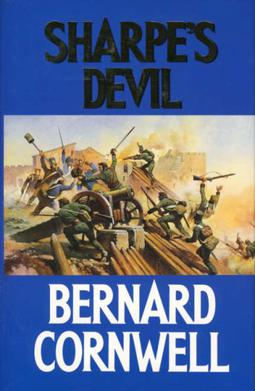
Sharpe's Devil is the twelfth historical novel in the Richard Sharpe series written by Bernard Cornwell and published in 1992. The story is set in 1820, with Sharpe and Harper en route to Chile to find their old friend Blas Vivar. Along the way they encounter the exiled Napoleon Bonaparte and the Scottish former Royal Navy officer Lord Cochrane. Chronologically, this is the most recent book in the series, with all subsequent novels depicting earlier events in Sharpe's career.
Sharpe's Rifles is the first of the Sharpe television dramas, based on Bernard Cornwell's 1988 novel of the same name. Shown on ITV in 1993, the adaptation stars Sean Bean, Daragh O'Malley and Assumpta Serna. It began a long series of successful and critically acclaimed television adaptations of the novels.
Bernard Cornwell's career started in 1981 with Sharpe's Eagle. He has been a prolific historical novelist since then, having published more than 60 novels.

The privateer brig Admiral Juel was the second largest ship in Denmark-Norway to be granted letters of marque during the Gunboat War between Denmark and Britain. The British Royal Navy captured her in a notable single ship action in 1808.














